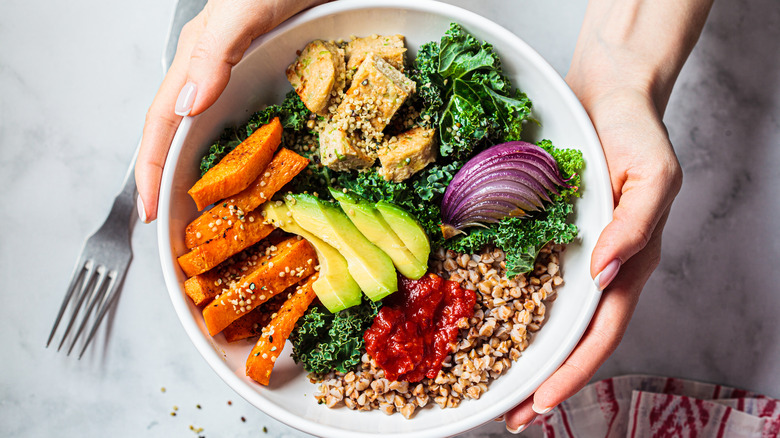A Nutritionist Tells Us The 3 Worst Eating Habits For Your Heart Health
Food plays an important role in heart health; just ask anyone you know who has high blood pressure or heart disease. Because of this, it's so easy to get lost in what habits you should be avoiding and what foods you must be eschewing for heart health. But according to Tamar Samuels, a registered dietitian and co-founder of Culina Health, even the science pertaining to heart-healthy eating is evolving. "For example, saturated fat has been shown to raise LDL cholesterol, the 'bad cholesterol' that is linked to an increased risk of heart disease. This has led to recommendations to limit saturated fat as part of a heart-healthy diet," explained the dietitian, speaking exclusively with Health Digest. "However, more recent research shows that not all saturated fats directly increase the risk of heart disease, and it's important to be mindful of the source of saturated fat and overall diet pattern before eliminating and/or reducing these foods." She referred particularly to whole-fat dairy, dark chocolate, and unprocessed meat, which apparently aren't linked to increased heart disease risk.
Per Samuels, it is more important to focus on your overall eating pattern and lifestyle. Everything from your genetic predisposition to your long-term lifestyle and diet habits plays a role, shared the expert. That being said, there are three eating habits you can avoid when it comes to heart health, with the first one being focusing on restriction instead of addition.
Why it's important to add rather than restrict
When thinking about the best diet for heart health, you could automatically end up focusing on restricting things from your diet rather than adding nutritious foods. This is one eating habit you can avoid, per Tamar Samuels.
"Identify heart-healthy foods that you enjoy and focus on adding more of them in your diet," shared the registered dietitian. "At mealtime, aim to make half of your plate produce by adding in a variety of vegetables and/or fruit that you enjoy eating." Leafy greens contain lots of the fat-soluble vitamin K, which helps protect your arteries, while vegetables of other hues, like orange carrots, bring the goodness of carotenoids. Aiming for at least three different colors when it comes to your fruits and vegetables will ensure you're getting the best of antioxidants and phytonutrients at every meal, explained the expert. Other things to add include "high-fiber carbohydrates (100% whole grains, beans, tubers with skins), lean proteins (fish, seafood, lean poultry, legumes), and heart-healthy fats (nuts, seeds, olive oil, avocado)."
When you start adding the good stuff, you're bound to have less room — on your plate and in your tummy — for the not-so-good stuff. Besides, the fiber content in fruits and vegetables will fill you up. Talking about not-so-good foods, ultra processed foods like chips, sweetened cereals, sodas, sausages, and bacon, refined grains, sugar, alcohol, and too much salt make up the list, per Samuels.
Practicing mindful eating could help you adopt heart-healthy eating habits
Mindful eating is not just a Buddhist practice; it's a lifestyle. From helping you enjoy the morsels of food in your mouth to preventing an uncomfortable bloat from overeating, practicing mindfulness during meal times can do a lot for your body.
Tamar Samuels recommends limiting the number of distractions during mealtime and listening to your body's hunger and satiation signals. "This helps [you] enjoy your food more and limits overeating," added the expert. Did you know that it takes about 20 minutes for your brain to communicate to your stomach that it's full? When you're sitting in front of the TV or looking at your phone while eating, you tend to not give yourself enough time for these signals to do their job, and you end up overeating.
If you enjoy your meal times in front of the TV too much, other tips include serving smaller portions of food on your plate and placing your fork down as you chew. Sometimes, seeing an already full fork waiting its turn to enter your mouth can make you swallow your food mindlessly. Counting your chews can help slow things down too. Chronic overeating has been linked to obesity, heart disease, stroke, and diabetes.
Skipping meals is not a great idea when it comes to your heart health
We skip meals for a number of reasons: being too busy to eat, guilt over a particularly indulgent food we had last evening, and sometimes, just plain forgetfulness.
But according to Tamar Samuels, skipping your main meals is not a good idea. "[This] leads to hunger and cravings for sweets and high-calorie meals. Aim to have a balanced meal/snack every 3-4 hours to balance your cravings," shared the expert. Went to bed without your dinner? You might wake up in the middle of the night with a craving, and late-night snacking can impact your heart too. Snacking on sugar and high-calorie foods can contribute to high blood cholesterol levels, heart disease, stroke, obesity, diabetes, and cavities.
At the end of the day, determining the best eating habits for cardiovascular wellness is also about finding ones that you can consistently adhere to — and Samuels' three tips promote just that. By adding the good stuff you enjoy, learning to enjoy your food with mindful eating, and ensuring that your main meals are full of colorful vegetables and fruits, whole grains, lean proteins, and healthy fats, you're setting yourself up to stay on track.




